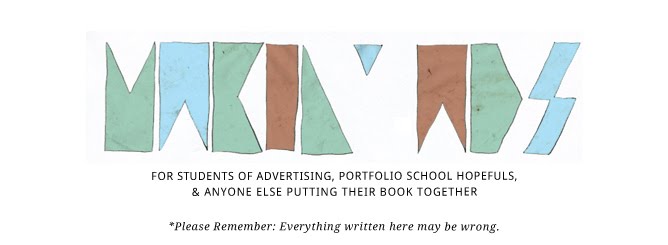Just a fun reminder that new ideas are really just unexpected combinations of existing ones.
What Occupy Wall Street Could Learn From Ad Folks

I wrote a post on my other blog over the weekend about the Occupy Wall Street's lack of clear messaging and how they might improve it by asking themselves the questions we ask ourselves each time we're trying to sell something. Greg asked me to post it here. Here's a link to it: The Message has an Occupy Wall Street Problem.
European Advertising
Here's a presentation I gave a few months ago. Hope you enjoy it.
And if you're interested in working overseas, click here to check out a free ebook that might help you get started.
And if you're interested in working overseas, click here to check out a free ebook that might help you get started.
Big Names in Integration
AICP judges on integration. Definitely worth two minutes of your time.
AICP NEXT 2011 from Joe Gabriel on Vimeo.
AICP NEXT 2011 from Joe Gabriel on Vimeo.
Warning: Your Portfolio May End in 2012
I've been reviewing a lot of student portfolios lately. And I have seen a lot of student campaigns about how [insert product here] will help you survive the end of the world that the Aztec calendar predicts will happen in 2012.
Let's all move on.
No more student campaigns about armageddon in 2012.
Let's all move on.
No more student campaigns about armageddon in 2012.
I Can't Say Negative Words Aren't Bad
There are those who believe you shouldn't use negative words in advertising because it will repel the audience and decrease sales.
This philosophy isn't concerned with subject matter, but actual words. Words like not, shouldn't, don’t, and even but. These words, some believe, should be strictly avoided.
This is nonsense. Don’t buy it.
Here is a positive statement: I LOVE to hurt puppies and kittens.
Here is a negative statement: People who hurt puppies and kittens are NOT good people.
Generally, I think sentences are more interesting when you replace the word “but” with “and.” But as the following statements demonstrate, it doesn’t always work.
Here is a positive statement: I lost all of my money, AND I had to declare bankruptcy.
Here is a negative statement: I lost all of my money, BUT I won the lottery the next day.
Since the One Show’s book, Advertising’s Ten Best of the Decade, 1980-1990 is within reach as I write this, let's go old school for a minute and look at some classic ads that never would have survived the Don’t Use Negative Words philosophy. (Apologies for the Dutch-angle scanning.)
Chances are, had you not been looking for them, you never would have noticed the "negative" words in these ads. You'd merely have seen them as clear and interesting pieces of communication.
Some may say, Fine. But isn't it better to try and write headlines that don't use negative words just as a precaution? Maybe. But your job as a writer shouldn't be to avoid using certain words. It should be to write clear and compelling copy.
This philosophy isn't concerned with subject matter, but actual words. Words like not, shouldn't, don’t, and even but. These words, some believe, should be strictly avoided.
This is nonsense. Don’t buy it.
Here is a positive statement: I LOVE to hurt puppies and kittens.
Here is a negative statement: People who hurt puppies and kittens are NOT good people.
Generally, I think sentences are more interesting when you replace the word “but” with “and.” But as the following statements demonstrate, it doesn’t always work.
Here is a positive statement: I lost all of my money, AND I had to declare bankruptcy.
Here is a negative statement: I lost all of my money, BUT I won the lottery the next day.
Since the One Show’s book, Advertising’s Ten Best of the Decade, 1980-1990 is within reach as I write this, let's go old school for a minute and look at some classic ads that never would have survived the Don’t Use Negative Words philosophy. (Apologies for the Dutch-angle scanning.)
Chances are, had you not been looking for them, you never would have noticed the "negative" words in these ads. You'd merely have seen them as clear and interesting pieces of communication.
Some may say, Fine. But isn't it better to try and write headlines that don't use negative words just as a precaution? Maybe. But your job as a writer shouldn't be to avoid using certain words. It should be to write clear and compelling copy.
Subscribe to:
Posts (Atom)






